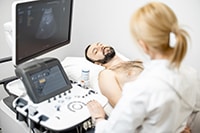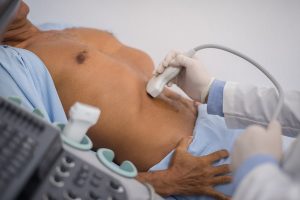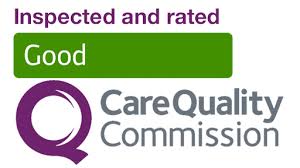Private Testes Ultrasound:
- Diagnostic ultrasound investigation of the Testis, Scrotal Sack, spermatic cord, Epididymis
- Used for testicular pain, swelling, and lumps
- Ultrasound for Testicular Cancer Screening
- No GP referral is required for this scrotal ultrasound
- Same time ultrasound results
- Fully qualified, experienced NHS sonographers and radiologists
- No preparation is required for the testes scan
- Same-day ultrasound scan appointment is usually available.
- Price: Only £159
- Book your ultrasound scan appointment Online or over the phone
- The Ultrasound clinic is located 3 mins walk from Notting Hill Gate station in London

Genuine 5-Star Google Reviews from 308+ patients
What is a testicular ultrasound?
A testicular ultrasound, also known as a scrotal ultrasound or testicular sonogram, is medical ultrasound test to examine the contents of the scrotal sac.
Ultrasound is a non-invasive diagnostic test that uses high-frequency sound waves to create images of the internal organs of the body and in this case of the testicles and surrounding tissues within the scrotum.
This ultrasound procedure is safe, painless, and does not involve radiation exposure, making it a low-risk method for diagnosing various medical conditions affecting the male reproductive organs.

Patient Reviews
Find out why we are the Top-Rated ultrasound provider in London.
- URVASHI PRASAD6/21/2025Great experience of a colour Doppler of the leg to check for deep vein thrombosis with Dr Moh and his team. Prompt and professional.Read MoreRead LessA M6/09/2025I had an ultrasound appointment with Yanni and I’m really happy with the care I received. Yanni was very professional and made me feel at ease throughout the appointment. Excellent service!Read MoreRead LessRosalie Li6/03/2025I had an Abdominal and Pelvic & Thyroid and Neck Ultrasound Scan with Yianni. He has a great sense of humour and made the experience much more comfortable. He was also very knowledgeable and patient, taking the time to explain everything clearly. Really appreciate his professionalism and kindness, highly recommend if you are looking for an ultrasound scan.Read MoreRead Less
- Elena5/24/2025Great experience, exceeded expectations. The saff is highly professional and welcoming. I definitely recommend.Read MoreRead LessRona Castrioti5/19/2025Best experience I've had with a Pelvic and Abdomen Ultrasound. Dr Tareq and made me feel very safe, comfortable and really shows understanding, care, expert knowledge and professionalism!Read MoreRead LessClare5/05/2025Friendly, professional and reassuring. Great service, would recommendRead MoreRead Less
What can the testicular scan detect?
The testicular ultrasound can detect and help with the diagnosis of a variety of testicular and scrotal abnormalities, including:
- Cysts - fluid-filled sacs that can develop in the testicles. Ultrasound can distinguish simple cysts from more complex masses.
- Varicoceles - enlarged veins in the spermatic cord that can cause pain and reduced fertility. Ultrasound visualizes the dilated veins.
- Hydroceles - fluid collection around the testicle. Ultrasound shows the fluid-filled sac.
- Epididymal cysts - non-cancerous cysts in the coiled tube at the back of the testicle. Appear as anechoic lesions on ultrasound.
- Testicular cancer - ultrasound has a high sensitivity for testicular tumours. It can detect small malignant masses and calcifications suggestive of cancer. Helps distinguish tumours from other testicular swellings.
- Testicular torsion - ultrasound with Doppler flow imaging can confirm or rule out testicular torsion, which is a twisted spermatic cord cutting off blood flow.
- Undescended testicle- ultrasound can locate testicles that have not descended into the scrotum.
- Inflammatory conditions like epididymitis and orchitis - ultrasound shows enlarged, hypoechoic, and hypervascular testicles.
- Trauma - ultrasound can detect testicular rupture, haematomas, or other damage from scrotal trauma.
- Reasons for infertility
Book your Private Testicular Scan
Don't wait for symptoms to worsen or for doubts to escalate.Price: Only £159
(£39 deposit is required)How much does a testicular ultrasound cost?
The cost of a private testicular ultrasound scan in our clinic in London is £149.
What is included with the private scrotal ultrasound?
The private scrotal ultrasound includes a digital diagnostic report with the findings, which you can share with your doctor or urologist and, if needed, ultrasound images and a follow-up recommendation.
What is the purpose of this scrotal ultrasound in London?
The scrotal ultrasound scan uses high-frequency sound waves to evaluate:
- Your testes
- Epididymis
- Spermatic cord
- Adjacent structures
What preparation is required for an ultrasound of the scrotum?
No preparation is required for a scrotal scan.
What should I expect during the testicular ultrasound examination?
Here's what you can expect during a testicular ultrasound examination:
- You'll be asked to lie on your back on an exam table with your legs slightly apart. The ultrasound operator will provide a paper towel to cover your genitals.
- The sonographer or radiologist will apply a warm, water-based gel to your scrotum. This gel allows the ultrasound transducer probe to make good contact with your skin and take clear images.
- The sonographer will gently press the transducer probe against different areas of your scrotum and roll it back and forth. They may apply varying pressure to get optimal views of the testicles and internal structures.
- As the probe is moved around, you may feel some mild pressure or friction on the scrotum, but there should be no significant discomfort.
- The sonographer will take images from several angles and orientations - front, sides, top and bottom of each testicle. If needed, they may also use Doppler ultrasound to assess blood flow.
- The examination usually takes 5-10 minutes.
- After the exam, you will be supplied with a tissue to wipe the gel, and you can get dressed. You can resume normal activities immediately afterwards.
- A digital report will be sent to you to share it with your doctor or to keep it for your records.
Understanding the Results of the testis ultrasound scan
The sonographer or the radiologist performing your scan will discuss the finding after your scan and will provide you with a digital report for your records and to share with your doctor.
Key points of the report will include the normalcy or abnormality of the appearance of your testicles, the presence of any cysts, lumps, or masses, and any signs of varicocele or other conditions. It is essential to ask questions during this discussion to fully comprehend your situation and the implications of the results.
Testicular ultrasound can detect several conditions, including testicular tumours, epididymitis (inflammation of the epididymis), hydrocele (fluid accumulation), varicocele (enlarged veins), and testicular torsion. It's also useful for assessing causes of infertility, such as low sperm production.
Possible Outcomes and the Next Steps for Diagnosis or Treatment
The outcomes of your testicular ultrasound could range from normal findings, indicating no further action is needed, to the identification of areas that demand additional investigation.
Here are some potential scenarios:
- Normal Results: If your ultrasound results are normal and you have no symptoms, no further action is generally required.
- Benign Conditions: Non-cancerous conditions such as cysts or varicoceles may be monitored with routine follow-up ultrasounds to ensure there are no changes.
- Suspicious Findings: If there are any suspicious areas or masses that could indicate testicular cancer or other serious conditions, your report will recommend further fast tract investigations via 2 week wait pathway.
- Other Abnormalities: If the ultrasound reveals other abnormalities such as evidence of infection or hernias, your doctor will discuss treatment options or surgery accordingly.
Frequently Asked Questions
Are testicular ultrasounds safe?
Yes, ultrasound scans are very safe. They use sound waves to create images and do not expose you to radiation like some other forms of imaging.
Will the testicular scan be painful?
Not at all. You may feel some pressure as the ultrasound probe is moved over the scrotum, but it should not cause pain. If you do feel discomfort at any point, please let us know immediately.
Do I need a referral for a testicular ultrasound?
No, you do not need a referral to book a testicular ultrasound at International Ultrasound Services. However, it might be beneficial to discuss your symptoms or concerns with your GP or specialist first.
What can the testicular scan detect?
The testicular ultrasound can detect and help with the diagnosis of a variety of testicular and scrotal abnormalities, including:
- Cysts - fluid-filled sacs that can develop in the testicles. Ultrasound can distinguish simple cysts from more complex masses.
- Varicoceles - enlarged veins in the spermatic cord that can cause pain and reduced fertility. Ultrasound visualizes the dilated veins.
- Hydroceles - fluid collection around the testicle. Ultrasound shows the fluid-filled sac.
- Epididymal cysts - non-cancerous cysts in the coiled tube at the back of the testicle. Appear as anechoic lesions on ultrasound.
- Testicular cancer - ultrasound has a high sensitivity for testicular tumours. It can detect small malignant masses and calcifications suggestive of cancer. Helps distinguish tumours from other testicular swellings.
- Testicular torsion - ultrasound with Doppler flow imaging can confirm or rule out testicular torsion, which is a twisted spermatic cord cutting off blood flow.
- Undescended testicle- ultrasound can locate testicles that have not descended into the scrotum.
- Inflammatory conditions like epididymitis and orchitis - ultrasound shows enlarged, hypoechoic, and hypervascular testicles.
- Trauma - ultrasound can detect testicular rupture, haematomas, or other damage from scrotal trauma.
- Reasons for infertility
Book your Private Testicular Scan
Don't wait for symptoms to worsen or for doubts to escalate.Price: Only £159
(£39 deposit is required)How much does a testicular ultrasound cost?
The cost of a private testicular ultrasound scan in our clinic in London is £149.
What is included with the private scrotal ultrasound?
The private scrotal ultrasound includes a digital diagnostic report with the findings, which you can share with your doctor or urologist and, if needed, ultrasound images and a follow-up recommendation.
What is the purpose of this scrotal ultrasound in London?
The scrotal ultrasound scan uses high-frequency sound waves to evaluate:
- Your testes
- Epididymis
- Spermatic cord
- Adjacent structures
What preparation is required for an ultrasound of the scrotum?
No preparation is required for a scrotal scan.
What should I expect during the testicular ultrasound examination?
Here's what you can expect during a testicular ultrasound examination:
- You'll be asked to lie on your back on an exam table with your legs slightly apart. The ultrasound operator will provide a paper towel to cover your genitals.
- The sonographer or radiologist will apply a warm, water-based gel to your scrotum. This gel allows the ultrasound transducer probe to make good contact with your skin and take clear images.
- The sonographer will gently press the transducer probe against different areas of your scrotum and roll it back and forth. They may apply varying pressure to get optimal views of the testicles and internal structures.
- As the probe is moved around, you may feel some mild pressure or friction on the scrotum, but there should be no significant discomfort.
- The sonographer will take images from several angles and orientations - front, sides, top and bottom of each testicle. If needed, they may also use Doppler ultrasound to assess blood flow.
- The examination usually takes 5-10 minutes.
- After the exam, you will be supplied with a tissue to wipe the gel, and you can get dressed. You can resume normal activities immediately afterwards.
- A digital report will be sent to you to share it with your doctor or to keep it for your records.
Understanding the Results of the testis ultrasound scan
The sonographer or the radiologist performing your scan will discuss the finding after your scan and will provide you with a digital report for your records and to share with your doctor.
Key points of the report will include the normalcy or abnormality of the appearance of your testicles, the presence of any cysts, lumps, or masses, and any signs of varicocele or other conditions. It is essential to ask questions during this discussion to fully comprehend your situation and the implications of the results.
Testicular ultrasound can detect several conditions, including testicular tumours, epididymitis (inflammation of the epididymis), hydrocele (fluid accumulation), varicocele (enlarged veins), and testicular torsion. It's also useful for assessing causes of infertility, such as low sperm production.
Possible Outcomes and the Next Steps for Diagnosis or Treatment
The outcomes of your testicular ultrasound could range from normal findings, indicating no further action is needed, to the identification of areas that demand additional investigation.
Here are some potential scenarios:
- Normal Results: If your ultrasound results are normal and you have no symptoms, no further action is generally required.
- Benign Conditions: Non-cancerous conditions such as cysts or varicoceles may be monitored with routine follow-up ultrasounds to ensure there are no changes.
- Suspicious Findings: If there are any suspicious areas or masses that could indicate testicular cancer or other serious conditions, your report will recommend further fast tract investigations via 2 week wait pathway.
- Other Abnormalities: If the ultrasound reveals other abnormalities such as evidence of infection or hernias, your doctor will discuss treatment options or surgery accordingly.
Frequently Asked Questions
Are testicular ultrasounds safe?
Yes, ultrasound scans are very safe. They use sound waves to create images and do not expose you to radiation like some other forms of imaging.
Will the testicular scan be painful?
Not at all. You may feel some pressure as the ultrasound probe is moved over the scrotum, but it should not cause pain. If you do feel discomfort at any point, please let us know immediately.
Do I need a referral for a testicular ultrasound?
No, you do not need a referral to book a testicular ultrasound at International Ultrasound Services. However, it might be beneficial to discuss your symptoms or concerns with your GP or specialist first.
Where Can You Get a Private Testicular Ultrasound Scan?
You can get a private testicular scan at International Ultrasound Services in London.
Clinic Address:
International Ultrasound Services
5a Lucerne Mews London
W8 4ED
Nearest tube: Notting Hill Gate (3 mins walk)
Tel: 0203 051 6506 or 0753 929 0816
E-mail:info@iuslondon.co.uk
Appointment Bookings
Monday – Friday: 9am-8pm
Saturday: 10am-1pm
Sunday: Closed
Directions to our Ultrasound Clinic.
Google Maps.
Do you need a Testicular Ultrasound scan?
Remember, early detection is key in managing many health conditions
Other Ultrasound Scans for Men we offer:
International Ultrasound Services offers private ultrasound scans for men and private ultrasounds for women from an easily accessible central London location.
Patient Resources
Testicular Ultrasound
Testicular ultrasound, also known as scrotal ultrasound, is an important...
Read MoreWhat Are the Benefits of a Private Testicular Ultrasound?
A testicular ultrasound is a non-invasive diagnostic imaging procedure that...
Read MoreWhen to Get a Testicular Ultrasound
Ultrasound imaging of your testicles (also referred to as a...
Read MoreTesticular Cancer: Symptoms, Diagnosis, Treatment, Prognosis
Testicular Cancer Ultrasound The testicular ultrasound is one of our...
Read More

















